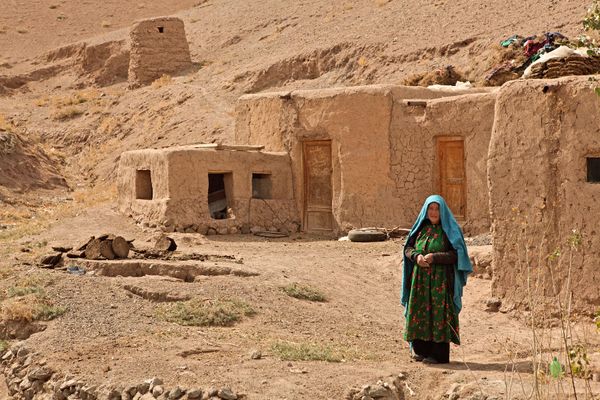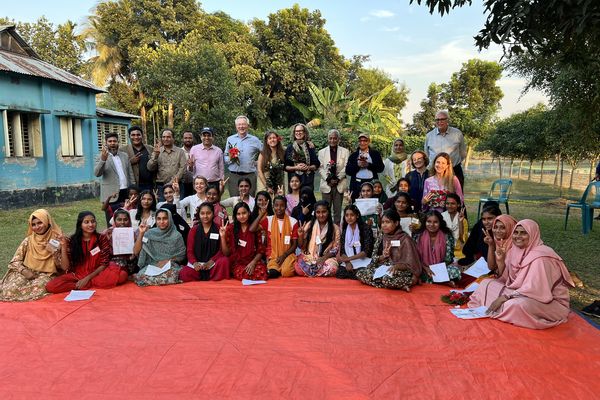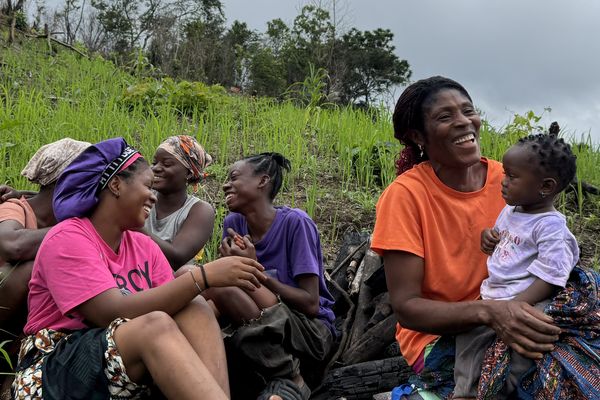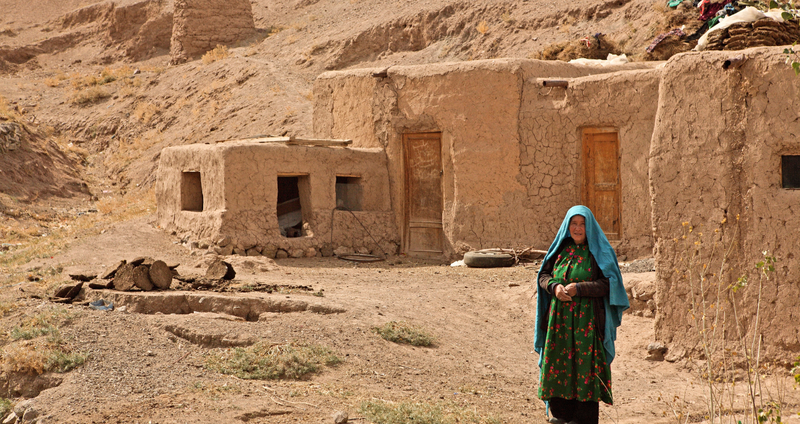
This is part one of a two-part blog series. Stay tuned next week for part two, when we’ll bring you three more stories of resilience from Afghanistan.
Afghanistan’s post-conflict humanitarian crisis bears similarities to Bangladesh’s post-war environment of the 1970s, when BRAC was born. We began adapting lessons learned from our poverty alleviation efforts to Afghanistan in 2002, BRAC’s first country of operation outside of Bangladesh.
Afghanistan remains a challenging context, with over half of the country’s population living below the poverty line. Decades of conflict combined with climate shocks have cut off many communities from livelihood opportunities.
BRAC serves communities in hard-to-reach areas across the country, and has reached around 17 million people through its programs in Afghanistan. Discover three of those people’s inspiring stories: women who have overcome great odds to bring positive change to their lives and communities.
When a decree barred girls from education, Razia became a fashion designer instead!
22-year-old Razia dreamed of finishing her studies and of someday having a career. Her two brothers helped her work towards her dream, supporting her education expenses by working as day laborers in their village, Asadabad, located in Afghanistan’s Kunar province. But after the former government collapsed in 2021, Razia was forced to drop out of school. She felt lost.
Political instability also affected the economy, meaning Razia’s brothers were out of jobs, too. The two used to support the household, and now with money scarce, tensions flared in Razia’s household.
With no prospect of returning to education for the moment, Razia decided she would try her hand at making handicrafts. During this time, she joined as a participant in BRAC’s ABADEI-1 program, where she received a cash stipend and training on sewing.
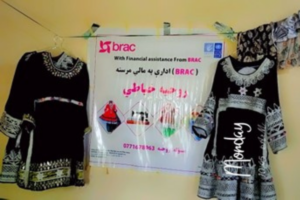 Razia began sewing clothes and handicrafts with custom designs. Her siblings even joined her efforts, helping her market her products by spreading the word about her creations among friends and peers.
Razia began sewing clothes and handicrafts with custom designs. Her siblings even joined her efforts, helping her market her products by spreading the word about her creations among friends and peers.
But her siblings didn’t stop there. They worked together like a well-oiled machine, each taking on a different role. They visited the markets often, scouting for opportunities to expand and sell Razia’s products at the local market. Her custom designs quickly caught the fancy of Asadabad residents, and Razia started earning around $220 US a month from her business.
As her work gained attention, Razia began to receive more orders: but soon found out that she was not able to take on all the new orders as she worked on the design and tailoring on her own. So, she decided to expand her business—and taught six other young women in the neighborhood.
Now with a thriving business, Razia and the young women she employs are a beacon of hope for women in Afghanistan. With the right tools, young women can change lives: and not just their own—they often take others along with them on their journey.
From homemaker to poultry farmer; from crisis to resilience
When life threw a curveball at Fatima, she decided to learn how to rear chickens and ensure she could support her family.
Fatima got married when she was just 21 after studying through twelfth grade. Hailing from Afghanistan’s Kunar province, Fatima moved in with her in-laws following her marriage, as is the custom in the country.
Fatima and her husband had three young children, and things were mostly going well for them, save the occasional family worries. But in 2021, after Fatima turned 26, her husband suffered a brain hemorrhage: one from which he would never fully recover.
Suddenly, Fatima was faced with managing the household of nine: her in-laws, her three children, and two young brothers-in-law. In hard-to-reach areas such as Kunar, where Fatima lives, job and employment opportunities are hard to come by.
What Fatima needed was a set of interventions specifically tailored to her needs: Something that would help her stay afloat, fill the gaps in her knowledge, and give her the “big push” she needed to change her situation permanently.
BRAC’s ABADEI project funded by UNDP, provides participants in Afghanistan with that “push,” pairing livelihood training with essential equipment, starter kits, and a cash grant to start a business.

Fatima joined the ABADEI project, where she learned to raise chickens, and received an incubator, drinker, feeder, solar panel, battery, lamp, switch holder, and vaccination kits to kick start her business. She also received a cash grant of $1160 to get her business off the ground.
Today, Fatima has a flock of about 500 chickens, and regularly hatches new chicks from her incubator. She sells most of the chickens, retaining around 15 for herself, from which she collects about 420 eggs monthly. She keeps half the eggs for her family, and sells the rest, earning approximately 15,000-16,000 Afghani ($219) per month.
Of her proceeds, she reinvests around 3000 Afghani to maintain her poultry business, and spends the rest on her family.
While life has not changed for Fatima overnight, she is now better prepared to face the challenges life throws her way: And, she’s on an upwards trajectory towards a secure, fulfilling future.
How does a young widow manage her way out of poverty in Afghanistan?
If you are looking for hope in a time of despair, Jamila’s story may provide just that. It is no secret that life in Afghanistan has its fair share of ups and downs for many families, but Jamila is one woman who has found a way to navigate these challenges with her head held high.
Jamila is from Tapa-i-Khan in the Surobi district. She is a young widow and mother of five. Before her husband passed away, he had been the sole breadwinner—and with him gone, she struggled to care for her children while keeping up with the family expenses.
She reached out to her neighbors and others in her community, hoping they could provide guidance or help.
And her community came through: It was through them that she learned about BRAC’s Ultra-Poor Graduation Program. The Graduation approach is a holistic set of interventions that enables families to chart a pathway out of extreme poverty.

Through the program, Jamila received a cow and five chickens, marking the beginning of her journey of transformation. She was diligent in managing her livestock, and overtime, her poultry flock grew to 21 chickens, which now produce a dozen eggs each day—a precious resource that helps Jamila feed her family. She sells the surplus eggs at the local market, further diversifying her income. Jamila’s cow also produces over 15 pounds of milk, which she sells in the local market. The sale of eggs and milk in the market earns Jamila an average of $8 per day.
Where Jamila lives, this steady income is life changing. And, the comprehensive support and mentoring she received through the Graduation program have offered her the “big push” she needed to break the cycle of extreme poverty and chart a positive future for her family.
It’s not just about the money, though: Jamila has developed a newfound sense of agency and pride, knowing that she has taken the first step to reclaim her future. She is confident in her ability to overcome life’s hurdles.
